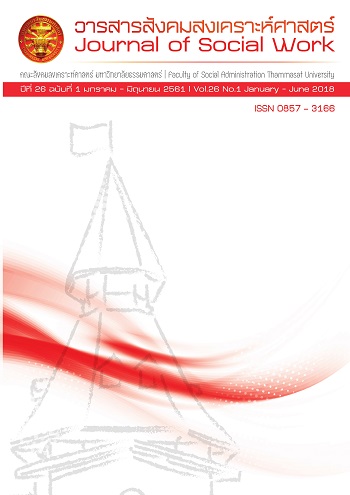The Community Restorative Justice Process : Proposed Recommendations Based on Critical Issues and Empirical Case Study
Keywords:
Justice Process, Community Justice, Restorative JusticeAbstract
This research studies for 1) the community restorative justice of Thailand comparative with international in terms of structure and process paradigm 2) the community restorative justice of Thailand in the current situation and 3) The existence of the development of the community restorative justice in Thailand. This research used documentary studies and qualitative research. Secondary data were collected from several documents related to Thai and international community justice. The Empirical case study was conducted by the formal interview and focus groups at Map Ta Phut Market’s community representative, including chairman, secretary and 18 members. The Critical Issues by The formal interview was conducted with various stakeholders such as judges, government officers and 5 Thai justices professional. Finally, data analysis by content analysis and conclusions of the community restorative justice of Thailand are presented. The results of this research found that 1) Most of the community justice in Thailand are not long-term communities. They are setup to solve specific problem and focus only on the short-term results. Once the short-term goals are reached, these communities are abandoned. 2) Map Ta Phut Market’s community is different from most communities in Thailand. Their community has existed for a long period of time and is focusing on long-term achievements. Map Ta Phut Market’s community manages itself in the form of mediation to reduce conflicts in the area while government will take part in supporting activities, regulatory, and legal knowledge. The private sectors are involved in the community by supporting its activities and balancing the use of natural resources 3) Based on the studies, this research found that prior the court system, the community acts as a defender to resolve problems. During the court process, the government and the community act as facilitators in case of litigation. After the court’s decision, government, community and private sectors act as supporters to help victim and convicted people happily live in the community.
References
กิตติพงษ์ กิตยารักษ์. 2541). กระบวนการยุติธรรมบนเส้นทางของการเปลี่ยนแปลง. กรุงเทพฯ : บริษัทสำนักพิมพ์วิญญูชน จำกัด.
กิตติพงษ์ กิตยารักษ์ จุฑารัตน์ เอื้ออำนวย และคณะ. 2550. ยุติธรรมชุมชน: บทบาทการอำนวยความยุติธรรมโดยชุมชนเพื่อชุมชน, กรุงเทพฯ: สำนักงานกองทุนสนับสนุนการวิจัย (สวก.).
คณะกรรมการปฏิรูปกฎหมาย. 2554. โครงการเวทีความคิดเพื่อการปฏิรูปกระบวนการยุติธรรมไทย. กรุงเทพฯ: คณะกรรมการปฏิรูปกฎหมาย.
คณะกรรมการสิทธิมนุษยชนแห่งชาติ. 2550. ปฏิญญาสากลว่าด้วยสิทธิมนุษยชน. กรุงเทพฯ : สำนักงานคณะกรรมการสิทธิมนุษยชนแห่งชาติ.
คณะกรรมการสิทธิมนุษยชนแห่งชาติ. 2552. รายงานประเมินสถานการณ์สิทธิมนุษยชนปี 2547-2550 ในประเทศไทย. กรุงเทพฯ: สำนักงานคณะกรรมการสิทธิมนุษยชนแห่งชาติ.
จุฑารัตน์ เอื้ออำนวย. 2548. กระบวนการยุติธรรมเชิงสมานฉันท์: การปรับกระบวนทัศน์กระบวนการยุติธรรมไทย. วิทยานิพนธ์ปรัชญาดุษฎีบัณฑิต สาขาสหวิทยาการ,มหาวิทยาลัยธรรมศาสตร์.
จุฑารัตน์ เอื้ออำนวย. 2548. กระบวนการยุติธรรมเชิงสมานฉันท์: การคืน “อำนาจ” แก่เหยื่ออาชญากรรมและชุมชน. กรุงเทพฯ: สำนักงานกองทุนสนับสนุนการวิจัย (สกว.).
จุฑารัตน์ เอื้ออำนวย. 2556. ระบบยุติธรรมและยุติธรรมทางเลือก : แนวการวิเคราะห์เชิงสังคมศาสตร์. กรุงเทพฯ : สำนักพิมพ์แห่งจุฬาลงกรณ์มหาวิทยาลัย.
จุฑารัตน์ เอื้ออำนวย และคณะ. 2550. ยุติธรรมชุมชน: การเปิดพื้นที่ของชุมชนในการอำนวยความยุติธรรม. กรุงเทพฯ: โรงพิมพ์เดือนตุลา.
ชนิดา จิตตรุทธะ. 2553. “การจัดการภาครัฐแนวใหม่: ประสิทธิภาพหรือความยุติธรรม”. วารสารการจัดการสมัยใหม่ ปีที่ 6 ฉบับที่ 2 (ก.ค.-ธ.ค. 2551): 11-26.
ดำรงศักดิ์ จันโททัย. 2549. การจัดการงานสังคมสงเคราะห์โดยมุ่งเน้นความสัมพันธ์กับผู้ใช้บริการ. วิทยานิพนธ์สังคมสงเคราะห์ศาสตรดุษฎีบัณฑิต (การบริการสังคม), มหาวิทยาลัยธรรมศาสตร์.
บวรศักดิ์ อุวรรณโณ. 2536. “ข้อสังเกตเชิงกฎหมายและนโยบายที่เกี่ยวกับทรัพยากรธรรมชาติ”. รพีสาร ปีที่ 1 ฉบับที่ 3 (เมษายน-มิถุนายน 2536): 22-29
เสรี พงศ์พิศ. 2542. เศรษฐกิจชุมชน : ทางเลือกเพื่อทางรอดสังคมไทย. กรุงเทพฯ : มหาวิทยาลัยธุรกิจบัณฑิตย์
เสน่ จามริก. 2547. สิทธิมนุษยชนในมุมมองระดับโลก. กรุงเทพฯ: สำนักงานคณะกรรมการสิทธิมนุษยชนแห่งชาติ.
สุรสิทธิ์ รุ่งเรืองศิลป์. 2546. การจัดบริการสังคมของเทศบาลในประเทศไทย. วิทยานิพนธ์สังคมสงเคราะห์ศาสตรดุษฎีบัณฑิต สาขาการบริหารสังคม, มหาวิทยาลัย ธรรมศาสตร์.
สุดจิต เจนนพกาญจน์. 2546. กระบวนทัศน์ในการพัฒนากระบวนการยุติธรรม. วิทยานิพนธ์สังคมสงเคราะห์ศาสตรดุษฎีบัณฑิต สาขาการบริหารสังคม, มหาวิทยาลัยธรรมศาสตร์.
รังสิต โลไทยสงค์. 2551. กระบวนการยุติธรรมชุมชน: กระบวนทัศน์และกระบวนการเสริมสร้างสังคมแห่งความเป็นธรรม. วิทยานิพนธ์ปรัชญาดุษฎีบัณฑิต สาขาวิชาบริหารศาสตร์, มหาวิทยาลัยแม่โจ้.
ลัดดาวัลย์ ตันติวิทยาพิทักษ์. 2550. ขบวนการประชาสังคมกับการพัฒนาประชาธิปไตยชุมชน. วิทยานิพนธ์ปรัชญาดุษฎีบัณฑิต สาขาวิชาสหวิทยาการ, มหาวิทยาลัย ธรรมศาสตร์.
ณัฎฐพงศ์ สุวรรณพาณิชย์. 2550. การมีส่วนร่วมในกระบวนการยุติธรรมชุมชน: ศึกษากรณีสำนักงานอัยการสูงสุด. วิทยานิพนธ์ปรัชญาดุษฎีบัณฑิต สาขารัฐประศาสนศาสตร์, มหาวิทยาลัยรามคำแหง.
ณัฐพล ชุมวรฐายี. 2552. ความพร้อมขององค์กรปกครองส่วนท้องถิ่นในการป้องกันและปราบปรามอาชญากรรมในชุมชน. คณะมนุษยศาสตร์และสังคมศาสตร์, มหาวิทยาลัยราชภัฏพระนคร.
นันทา ติงสมบัติยุทธ. 2546. การเพิ่มขีดความสามารถของชุมชนในการพึ่งพาตนเอง. กรมส่งเสริมการเกษตร, มหาวิทยาลัยเกษตรศาสตร์.
วราภรณ์ บัวเผื่อน. 2549. บทบาทและการมีส่วนร่วมของชุมชนในกระบวนการยุติธรรมเชิงสมานฉันท์. วิทยานิพนธ์ศิลปะศาสตรมหาบัณฑิต สาขาการบริหารงานยุติธรรม, มหาวิทยาลัยธรรมศาสตร์.
Bureau of Justice Assitance. 2001. Community Justice in Rural America: Four Examples And Four Future. Washington: Washington DC. office of Justice program.
Dandurand, Y., K. Kittayarak, and A. Macphail. 2015. Justice Indicators and Criminal Justice Reform A reference Tool. Vancouver, British Columbia, Canada: International Centre for Criminal Law and Criminal Justice Policy and the Thailand Institute of Justice.
Denhardt J. V. and R. B. Denhardt. 2007. The New Public Service. New York: M.E. Sharpe, Inc.
Karp, D and T. Clear. 2000. Community Justice : Conceptual Framework,in Boundary change in criminal justice organization. USA : Washington D.C..National Institute of justice.
Marshell, T. F. 1996. The evolution of restorative justice in Britain. European Journal on Criminal Policy and Research. 4 (4): 21-43.
McCold, P and T. Wachtel. 2002. Restorative justice theory validation. UK: Willan Publishing.
Sherman, L. W. 2002. Trust and Confidence in Criminal Justice. NIJ Journal March (2002) : 23 - 31.
The United Nations. 2011. The United Nations Rule of Law Indicators Implementation Guide and Project Tools. United Nations Publication
Zehr, H. and J. Braithwaite. 1995. Re-Thinking Criminal Justice: Restorative Justice. USA: National Criminal Justice Reference Service.
Downloads
Published
How to Cite
Issue
Section
License
The manuscripts published in the Social Work Journal is the copyright of the Social Work Journal, Thammasat University
Any article or opinion appeared in the Social Work Journal will solely be under the responsibility of the author The Faculty of Social Administration, Thammasat University and the editors do not need to reach in agreement or hold any responsibility.



